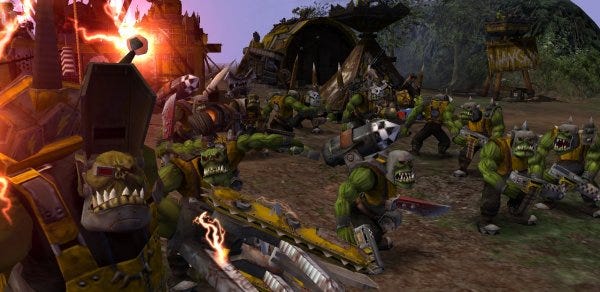Idle Musing: The Joy Of Unwinnable Skirmishes
Relaxing Meatgrinders
Or at least against the odds skirmishes. This is an afternoon ode to that time when you set up a skirmish mode in an RTS and pitch yourself against extraordinary odds (perhaps with a chum to help you). It's one of those little pleasures that I think most RTS players understand, but is probably unknown by, well, the rest of humanity.
Yes, the "Idle Musing" prefix indicates a vague attempt at a new series in which I will look at the little things that make games so satisfying, and try to describe them in a way that makes them clearer to all. I want to spend a bit of time talking about the nuances of game-playing experiences that we see across lots of different games, those things that gamers return to games for that aren't always on the prescribed feature lists of the Next Big Thing. These are the subtle satisfactions derived from a deeply sophisticated form of entertainment, and many of the key reasons why we keep coming back.
Anyway, yes, those big skirmishes.
I've lost count of the number of games I've actually done this in, or been able to do this in, but the two I generally reach for when I want to do this stuff are Dawn Of War and Supreme Commander. The experience in each is rather different, for while they're both real-time strategies with some robo-death, their pace and scope is radically different. What they both offer, however, is the possibility of starting out in a strong position, which you can quickly consolidate, and then playing against multiple AI which you can balance back and forth to find that sweet spot where you can't quite, or can *only just* beat them.
Dawn Of War usually unfolds a bit quicker than Supreme Commander, and the time it takes either you, or the AI, to build an unstoppable army of destruction usually doesn't top about twenty minutes, although resource and tech-tree deadlock can prolong it. Usually the tide turns when a few of the super-units are unlocked, and THOOM, they rip through someone's lines, and then it's just tidying up.

It's not quite the same with SupCom, which has such enormous scale that this process can take hours if the deadlock sets in. There's something extraordinarily satisfying about the experience, however, and not least because of the sheer difficulty of taking on the hardest AI. The concentration required to manage the battles which will take place as you secure your resources is one of those things that is rewarding in its own right: a sort of “best use of consciousness” that you get from being really focused on an activity. In SupCom this isn't something you're best doing solo, either. While in Dawn Of War I'd be happy to play alone versus a selection of normal and hard AI, Supreme Commander is arguably best played versus a couple of hard AI versus a co-op team, with the co-ordination such a thing entails. You'll want a very big map and all afternoon to pull it off, of course.
Most recently, I notice, Men Of War Assault squad has formalised this kind of play with a DLC that is simply waves of increasingly tough baddies that you fight off until you are overwhelmed. They're recognising exactly the kind of setup I am talking about here and making a game mode out of it.
The way RTS games work means that this sort of rolling crises management is unique to them, and I can't think of anything else that is particular analogous. Consequently, explaining the appeal of the skirmis is similar to trying to explain the feeling of being engrossed in a novel to someone who cannot read. It's that sort of “if a Lion could speak we could not understand him” territory. Even though gamers can speak, people do not really understand what they are saying.
I suppose what I find interesting about this stuff is that it doesn't allow you time to think, but is also not demanding of reflexes in the same way that a bout Quake is. The challenge is no less engaging, or demanding of attention and quick-thinking, but because of the way your attention has to be spread across the multiple units, there is a sort of higher pleasure in tactical thinking. Also when you are playing with the variables of a game's skirmish modes you get a sense of tinkering with a larger system: fiddling with the workings of an engine that you can then see the results - either in being overwhelmed by AI hordes, or just about being able to
The preference for it being a skirmish game, of course, is that it is not competitive. While it can be intense and focused – and you can even be beaten AI – not having an actual human opponent removes an important psychology anxiety. This, therefore, is, I think, the most relaxing way to play an RTS. No worries about an ongoing campaign, or unlocking the next bit of unit-tree from the story – you've got everything to play with, and it becomes a continuous feedback loop of gathering resources and sending tiny men to their deaths. And I could do that forever.









